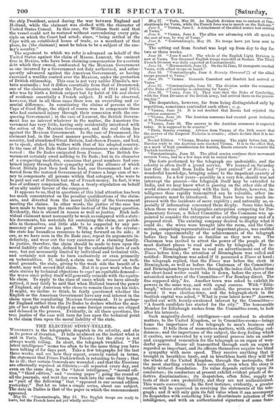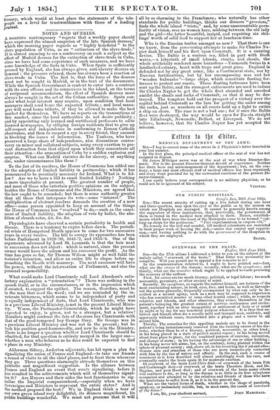THE ELECTRIC STORY-TELLER.
WoNnirarur. is the telegraphic despatch in its celerity, and eke in its power of iteration. It tells us almost on the instant what is said in Paris, Berlin, Vienna, or Trieste ; but the story is not always worth telling. In short, the telegraph twaddles. "The latest intelligence" seems too often to be the same thing you have been talking of for days past. Take a few telegraphs for the last three weeks, and see how they repeat, scarcely varied in terms, the statement that Prince Paskiewitsch is returning to Tassy ; that he is ill; that certain Generals are wounded ; and that the Russians are effectually repulsed at Silistria ;—all repeated every day, and even on the same. day, in the "latest intelligence," "second edi- tion," "third edition," and "evening paper "; going the round of all the journals, and next day even back into the same that began, as "part of the following" that "appeared in our second edition yesterday." But let us take a simple series, about one subject. The date in Italics is that of the paper in which the announcement appeared. May 25. " Constantinople, May 15. The English troops are ready to leave, but the French have not yet wholly arrived." May 27. " Paris, May 26. An English division was to embark at Con- stantinople for Varna, while the French force was to march on the Balkans." June 3. " Vienna, June 2. A detachment of the allied armies had arrived at Varna."
June 5. "Vienna, June 4. The allies are advancing with all speed to the seat of war, by way of Varna."
June 8. " Constantinople, May 29. No troops have yet been sent to Varna."
The setting out from Scutari was kept up from day to day for two or three weeks.
June 10. " June 8 and 9. The whole of the English Light Division is now at Varna. Ten thousand English troops were still at Scutari. The Third French Division was daily expected at Constantinople. June 14. " Hermanstadt, June 13. On the 25 June, 22 transports reached Varna, with allied troops on board." June 16. " Constantinople, June 5. Seventy thousand (!) of the allied. troops proceed to Varna." June 19. "Vienna. Generals Canrobert and Scarlett had arrived at Varna."
June 22. "Constantinople, June 12. The division under the command of the Duke of Cambridge is embarking for Varna." June 26. "Yams, June 15. They state that the Duke of Cambridge, with the First Division of the British army, had arrived there on the preced- ing day."
The despatohes, however, far from being distinguished only by repetition, sometimes contradict each other ; e. g. "Vienna, June 14. It is not doubted that Russia had rejected the Austrian summons."
"Vienna, June 20. The Austrian summons had created great irritation at St. Petersburg."
"Vienna, June 26. The answer to the Austrian summons is expected today. It is supposed to be evasive."
"Paris, Sunday evening. Advices from Vienna of the 24th assert that the answer of the Emperor Nicholas is evasive ; others declare that it is ne- gative." Second Edition. "Vienna, Monday morning. The night before last, the Russian reply to the Austrian note reached Vienna. It is to the effect that, as a mark of high consideration for Austria, Russia consents to evacuate the Turkish territories."
"Constantinople, June 22. The allied armies continue their movement towards Varna, and in a few days will be united there."
The feats performed by the telegraph are undeniable, and the celerity is often itself a grand service. We learned on Saturday last that the mail from India had "just arrived" at Trieste ; a wonderful knowledge, bringing solace to the impatient anxiety of numbers. In a few years—possibly in a very few, should war not interrupt the process—the telegraph itself may be extended to India, and we may know what is passing on the other side of the world almost simultaneously with the fact. Before, however, in- telligence thus rapidly transmitted can be valuable, other im- provements must be introduced. Men have been too much im- pressed with the incidents of mere rapidity; and naturally so, es- pecially if information concerned them deeply. Some time back, when there were rival telegraphic enterprises competing for Par- liamentary favour, a Select Committee of the Commons was ap- pointed to consider the enterprise of an existing company and of a proposed rival. The existing company desired to display what it could do ; the wires were brought into the room, and the Com- mittee, comprising representatives of important places, was enabled to judge experimentally of the achievements of the telegraph before they had become so familiar as they now are. The Chairman was invited to attest the power of the people at the most distinct places to read and write by telegraph. For in- stance, "Birmingham" was to read an advertisement out of the Times before him; the attention of Birmingham was called and notified : Birmingham was asked if it possessed a Times at hand; the telegraph replied, that the Times was before the clerk in Birmingham, as well as before the Chairman of the Committee; and Birmingham began to recite, through the index-dial, faster than the short-hand writer could take it down before the eyes of the astonished members of the Committee—" down, Bombay direct. The fine coppered ship," &c. Another town was asked to exhibit its powers in the same way, and with equal success. With "Edin- burgh," whose attention was next called, the process was a little varied: it was election-time, and the telegraph-clerk in the Scottish capital was asked, " What is your latest news?" Answer, spelled out with keenly-awakened interest by the Committee- " A fourth candidate has started for the city.' The honourable Member for Edinburgh rushes from the Committee-room, to look after his interests.
Such magically-darted intelligence—not confined to election matters, to the -United Kingdom, or to Committee-rooms—brings home the importance of the telegraph to men's business and bosoms. It tells them of momentous matters, with startling sud- denness; and the importance of the subject, the deep feeling which it excites, are converted by a very natural process into an undue and exaggerated veneration for the telegraph as an organ of won- derful power. Hence all transmitted through such an organ is regarded as important, and its officers themselves acquire too blind a sympathy with mere speed. They receive anything that is brought in breathless haste, and in breathless haste they will tell the whole of the United Kingdom, through the metropolis, that the most startling events have occurred, even when the story is totally without foundation. Its value depends entirely upon its conductors ; its conductors at present exhibit evident proofs of de- fective discrimination ; its despatches, often false, supply no tests of their own probability, and they are not authenticated. This wants correcting. In the first instance, evidently, a greater caution will be exercised in receiving the statements of the tele- graph ; and it will only gain its full value when it -ean accompany its despatches with something like a discriminate helection of the intelligence, and with an authenticated signaturfi of some fano- tionary, which would at least place the statements of the tele- graph on a level for trustworthiness with those of a leading journal.



































 Previous page
Previous page